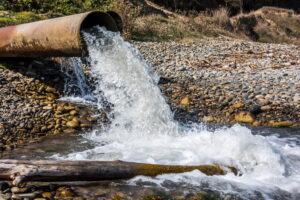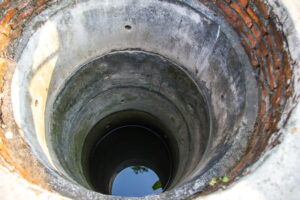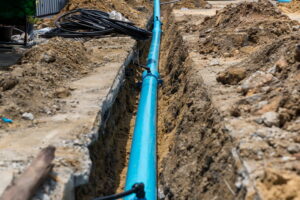If you are thinking about moving to Las Vegas or even if you have lived here your entire life, you may wonder how the sewer system of Las Vegas works. Understanding how Vegas’ sewer system works is essential, especially when you are connected to the sewer system and have to pay a monthly bill to the city for sewer services.
Does Las Vegas have a sewer system?
Yes, Las Vegas has an extensive sewer system to collect wastewater. The city’s sewer system is operated and maintained by the Southern Nevada Water Authority (SNWA). The SNWA also operates a comprehensive system of water reclamation facilities, pumping stations, reuse systems, and other infrastructure to ensure that treated wastewater can be safely reused or discharged into local rivers and lakes.
What city of Las Vegas sewer services are available?
Las Vegas provides wastewater collection and treatment services for the city and surrounding communities. This includes residential, commercial, and industrial customers. The city also operates a stormwater drainage system to manage both surface water runoff from rainstorms and groundwater from springs or other sources.
Have plumbing or sewer problems in Las Vegas? Contact Larkin Plumbing for all your plumbing needs today.
Does Clark County participate in water reclamation?
The SNWA is a joint powers authority between Clark County and the City of Las Vegas. The SNWA also contracts with the Clark County Water Reclamation District (WRO) for certain operations related to water reclamation and wastewater treatment.
How is water reclaimed?
Wastewater is reclaimed in Las Vegas through a variety of processes. This includes the physical treatment process, such as settling tanks, chemical treatments like chlorination, and biological treatments using various methods and aeration lagoons. In addition, recycled water is used for agricultural irrigation and non-potable uses.
What are the environmental benefits of water reclamation?
The environmental benefits of water reclamation include:
- The conservation and reuse of a valuable resource
- Reduction in water pollution
- Protection of aquatic ecosystems
Reclaimed wastewater can be used for non-potable purposes such as agricultural irrigation and industrial processes, which can reduce the need to extract additional freshwater from natural sources.
In addition, reclaimed wastewater is typically treated to higher standards than what is required by law for discharge into local waterways. This helps protect aquatic ecosystems from pollutants that could otherwise cause harm.
Can you have well water in Las Vegas and Las Vegas sewer services?
You can currently have well water in Las Vegas and Las Vegas sewer services. Homeowners who opt for the well water option for their indoor plumbing will need to connect their home’s plumbing system to the city’s sewer service to properly dispose of their wastewater.
How reliable is the sewer system of Las Vegas?
The sewer system of Las Vegas is very reliable. The SNWA operates and maintains the regional wastewater collection and treatment systems in the Las Vegas Valley, including state-of-the-art technologies such as odor control, disinfection systems, solids processing facilities, and advanced instrumentation.
These proven technologies help ensure that treated wastewater can be safely reused or discharged into local rivers and lakes without any environmental risks.
How much do sewer services cost in Las Vegas?
Rates for sewer services in Las Vegas are determined by the Clark County Water Reclamation District’s Board of Trustees. The rates vary based on residential and commercial customers; however, they are billed using an equity basis determined by the type of property (e.g., condo, single-family home, or mobile home). Furthermore, homes with pools are usually billed at a higher rate.
Can I have a sump pump with city sewer services?
You can have a sump pump with city sewer services when required. However, you should check with your local plumber for installation requirements and regulations.
Am I required to use the city’s sewer services if I have a septic tank?
Currently, residential homes with septic tanks are not required to connect to the city’s sewer system. However, if Assembly Bill 220 passes, then homes within 400 feet of the city’s sewer system will be required to connect to the city’s sewer system.
The bill also calls for homes with well water to connect to the Las Vegas Water District’s water system if the water supply lines are within 1,250 feet of the house. In addition, the bill calls for the city to pay for half of the connection costs.
However, many residents are upset by the bill and have expressed their opposition to it, mainly because of the costs they would incur. If the bill passes, homeowners will have until 2054 to connect to the city’s sewer system or water supply system.
The reason the city wants homeowners to connect to the city’s sewer system is that the water in the city system is reclaimed and recycled. Once the water has been reclaimed, it can be sent to Lake Mead, where it can be reused.
Additionally, reclaimed water can help address the water shortage conditions in Las Vegas. Conversely, in homes with septic systems, the water is lost because it cannot be reclaimed.
Who is responsible when I have problems with the main sewer line?
It depends on where the problems are with the main sewer line. For example, if the problem with the sewer line is somewhere on your property, you are typically responsible for any repairs. You should contact a licensed plumber in Las Vegas from Larkin Plumbing to conduct an inspection, determine the source of the problem, and whether it is your responsibility.
On the other hand, the city is responsible for main sewer line problems when the problem is not on your property. So, if the problem occurs past your property line, then you would need to contact the city to have them make any necessary repairs.
When you have sewer line problems, call our experienced plumbers to determine if you or the city is responsible for the repair.
Sources:
Haas, G. (2023). Las Vegas Residents Defend Septic Tanks as Costly Switch to Sewer System Proposed.
Water Recycling and Reuse: The Environmental Benefits. (2017).
Water Shortages. (2022).



